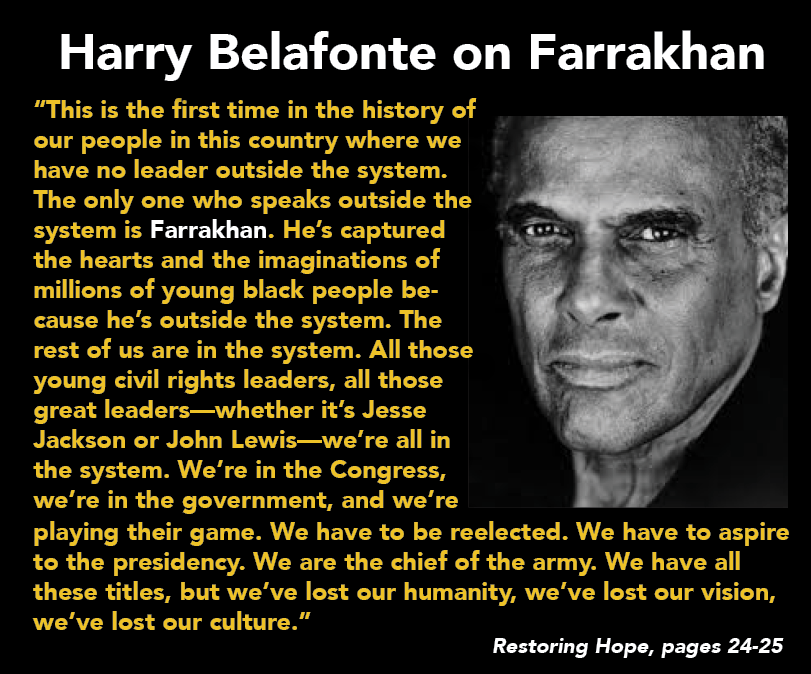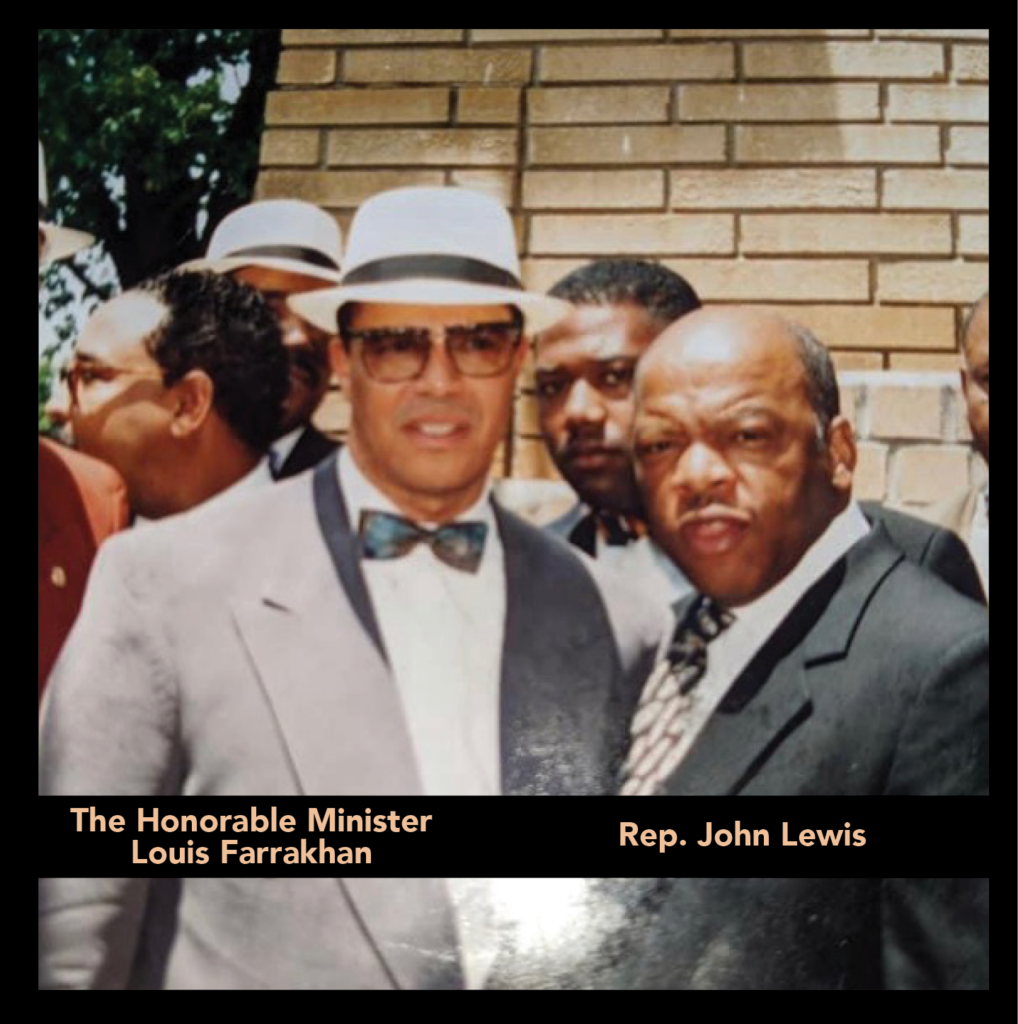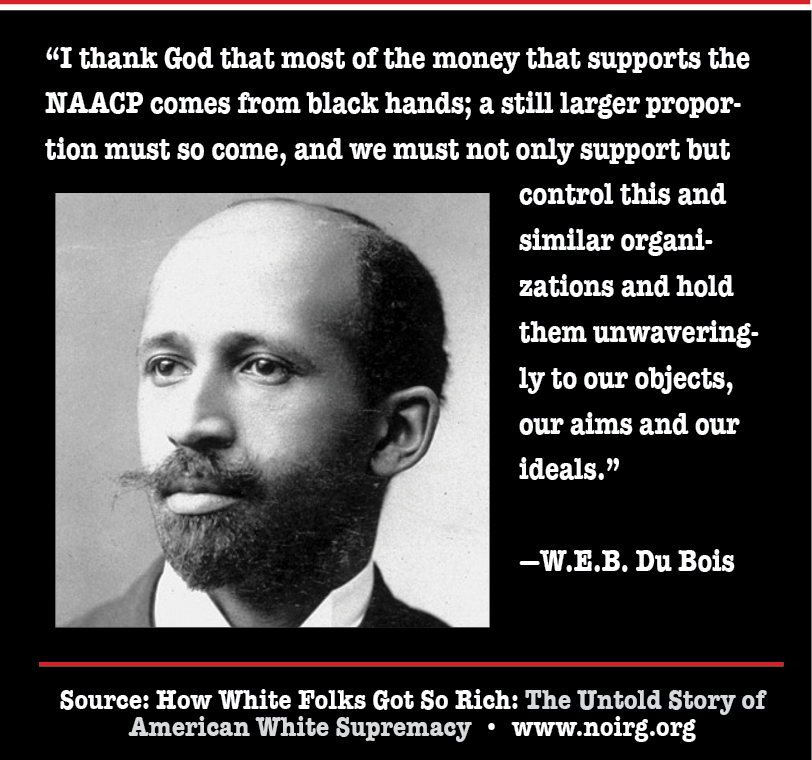Sounds A Lot Like Elijah: Surprising Words from Civil Rights Leaders
by Tingba Muhammad, NOI Research Group
Give the white man a chance and he will snatch our Black leaders, redefine, rework, and repackage them, and reduce them to milquetoast racial mascots forever satisfied singing spirituals and slinging empty slogans. He will present them to our school-aged Black children for no other purpose than to lead them right back into slavery. In fact, they have commandeered the whole month of February just for that purpose.
The Honorable Minister Louis Farrakhan is having none of this. And even as he is the impenetrable target of the world’s greatest slanderers, he is almost single-handedly resurrecting the racial reputations of our historical greats and restoring their legacies in our people’s hearts and minds. By holding the Nation of Islam’s annual Holy Day of Atonement in Tuskegee, Alabama, he was teaching us of the great value and dignity of a forgotten and much-maligned man, Booker T. Washington, and the great Tuskegee scientist, George Washington Carver. Booker T’s work in building an institution for Black education has been often mischaracterized by those whites who fear his strategy to achieve Black economic strength—but their lies and distortions will no longer go unchallenged today.
Min. Farrakhan was invited to Alabama by civil rights leaders, where he toured the state dedicating his speeches to reviving the unknown and suppressed words of the great Rev. Dr. Martin Luther King, proving him to be a far deeper intellect and strategist than we ever knew. Farrakhan is doing this. And we now must revisit our historical leaders and look into their minds and hearts and find the common love for our people that makes them dangerous to white supremacy—not child-proof emblems of negro history.
 Here are a few surprising words from great men and women who stood up for Black people even as the enemy refused to tell us what they were actually saying. In many cases, Blacks who we were told rejected the Teachings of Elijah Muhammad and the Nation of Islam sounded a lot like the greatest leader of all:
Here are a few surprising words from great men and women who stood up for Black people even as the enemy refused to tell us what they were actually saying. In many cases, Blacks who we were told rejected the Teachings of Elijah Muhammad and the Nation of Islam sounded a lot like the greatest leader of all:
The Rev. Dr. Martin Luther King, Jr., told his friend singer Harry Belafonte, “I’ve come to the realization that I think we may be integrating into a burning house.” King ultimately found that integration “ended up as merely adding color to a still predominantly white power structure.” He conceded that “there are points at which I see the necessity for temporary separation as a temporary way-station to a truly integrated society.”
Paul Robeson, the great athlete, entertainer, and activist, thought deeply on racial issues:
“Partisan interests must be subordinated to Negro interests—by each of us. Somehow we must find the way to set aside all that divides us and come together, Negroes all. Our unity will strengthen our friends and win many more to our side; and our unity will weaken our foes who already can see the handwriting on the wall.”
And here is why whites tried to kill him:
“The modern white American is a member of the lowest form of civilization in the world today….My problem is not to counteract his prejudice against the negro…that does not matter. What I have set myself to do is to educate my brother the negro to believe in himself. All American negroes want to be exactly like the white man. If they succeed, within the next generation they will destroy themselves. I want to lead the negro out of this new Egypt into a new promised land. We are a great race, greater in tradition and culture than the American race. Why should we copy something that is inferior?”
Rev. Ralph Abernathy was an aide to Dr. Martin Luther King and he took over leadership of the civil rights movement after the U.S. government murdered Dr. King:
“[The] programs of the American Government in her dealings with the poor of all minority groups lead to genocide….When we look at America from the perspective of the poor, we see only destruction and death, exploitation and oppression, yes, we see genocide. Those things which make America great for you are denied to us and the attempts of the Government to administer to our needs lead only to further destruction.”
 Rep. John Lewis is the long-time congressman from Georgia. He marched in the civil rights movement and endured much caucasian abuse and violence. A true integrationist, but he had sobering words about our “white friends”:
Rep. John Lewis is the long-time congressman from Georgia. He marched in the civil rights movement and endured much caucasian abuse and violence. A true integrationist, but he had sobering words about our “white friends”:
“I think past history will testify to the fact that white liberals and the so-called affluent Negro leaders will not support all our demands. They will be forced to support some of them in order to maintain an image of themselves as liberal. But we must also recognize that their material comforts and congenial relations with the establishment are much more important to them than their concern for an oppressed people. And they will sell us down the river for the hundredth time in order to protect themselves.”
Civil Rights leader Whitney Young was so detested among Black Power advocates that they nicknamed him “Whitey” Young. If only they knew what he really thought about white people:
“We need to unleash all of the great researchers who have been spending all their time studying black people—and making money—onto the subject of white people to find out what in the world is wrong with that Man that makes him so obsessed with feeling superior. Why does he have to have somebody to feel superior to? I’d like to study why he wants to bring up his children in those bland, sterile, antiseptic, gilded ghettos, giving sameness to each other, producing stagnation and uncreative people in a world that’s become a neighborhood. Why does he want to teach his child to disrespect people because of their occupation or their race? I think there’s a sickness here, and it ought to be studied by those same people who’ve been making their living revealing the pathologies of black people.”

W.E.B. Du Bois was one of the greatest scholars of Black America but he also has been touted as a die-hard integrationist: Here he sounds very much like he supports The Hon. Elijah Muhammad’s Economic Blueprint:
“I thank God that most of the money that supports the National Association for the Advancement of Colored People comes from black hands; a still larger proportion must so come, and we must not only support but control this and similar organizations and hold them unwaveringly to our objects, our aims and our ideals.”
Fannie Lou Hamer was a strong advocate for justice and a critical part of the civil rights struggle. Her assessment of tepid negroes was absolute
“They’re these middle-class Negroes, the ones that never had it as hard as the grass roots people in Mississippi. They’ll sell their parents for a few dollars. Sometimes I get so disgusted I feel like getting my gun after some of these school teachers and chicken-eatin’ preachers.”
Julian Bond is a strong figure of civil rights history, thought to be an integrationist, except…:
“It makes it easier for us to be a mental nation, a nation within a nation. We’re a nation separate and apart in our problems and have to be dealt with separate and apart. And we have to think of ourselves as different from the whole.”
Black Teachers! Let us take these Black historical figures off our classroom walls and put them back into the hearts and minds of our students! Direct our children to research the powerful words of these Great Men and Women and reclaim them as the lovers of Black freedom and the deep thinkers that they always were. Minister Farrakhan—the deepest of our Thinkers and the synthesis of them all—has led the way. Let us, once and for all, restore the integrity of our Black Thinkers and in the process spark those same leadership qualities in our own Black children. Amen!

